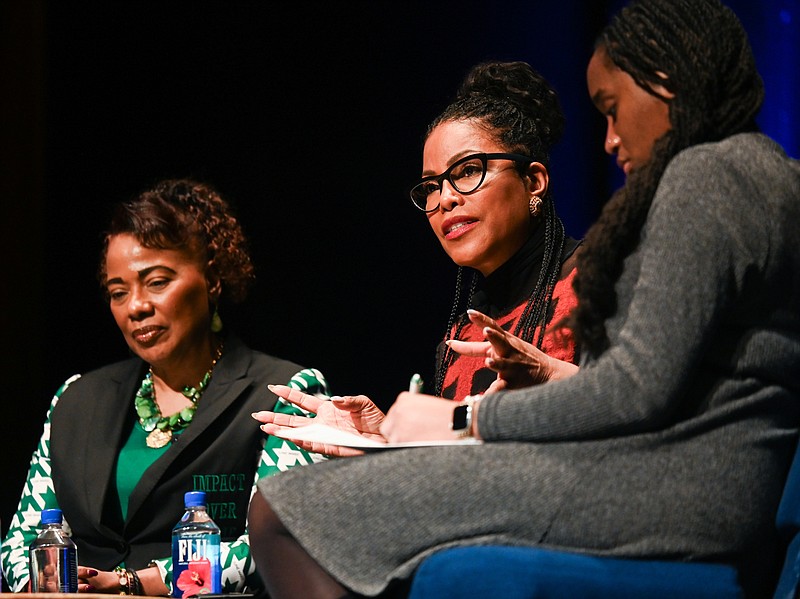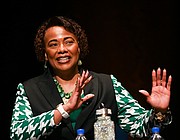Martin Luther King Jr. and Malcom X had the same goal, according to their respective daughters, Bernice King and Ilyasah Shabazz.
Speaking Friday at the Memorial Auditorium, King and Shabazz's appearance marked the 11th year of the University of Tennessee at Chattanooga's Martin Luther King Jr. Day speaker series. It was the first time the event was held off-campus.
"Malcolm and Martin don't have to be presented as a conflict," King said. "Instead of presenting people as opposites, let's just extract those things that complement and can move us forward to create a just, human, equitable and peaceful world. ... This is a display today, a demonstration that they're not enemies."
UTC Vice Chancellor for Engagement Stacy Lightfoot and Student Government Association President Chamyra Teasley interviewed the pair, asking about their joint experience as the daughters of civil rights activists and the role of activism today.
King and Shabazz have worked to maintain their parents' legacies. King is the chief executive officer of the Martin Luther King Jr. Center for Nonviolent Social Change in Atlanta, and Shabazz is chair of the Malcolm X and Dr. Betty Shabazz Memorial and Educational Center in New York City.
Both said the common perception of their fathers doesn't reflect who they were.
Photo Gallery
Daughters of Martin Luther King Jr., Malcolm X talk about their parents’ legacies, service at UTC MLK Day event
"My mother, as a young woman, had to safeguard her husband's legacy because of all of these negatives and horrible things that they said about him," Shabazz said. "Malcolm was a devout steward of God. He was working to get the boot off of everyone's neck. He believed in our humanity. And he believed that America should live up to her promise of liberty and justice for all of its citizens."
People feel comfortable finding the part of what Martin Luther King Jr. said that fits their agenda, his Bernice King said. She pointed to one of his most well-known quotes from his "I Have a Dream" speech about his dream that his children will "one day live in a nation where they will not be judged by the color of their skin but by the content of their character" as an example of how his words have been taken out of context and weaponized.
"My father did not want us not to recognize color or culture," King said. "He was talking about a world after we addressed and eradicated racism. Racism is still a part of our world."
Shabazz spoke extensively about the effect her mother had on her life and in ensuring that she was raised with her father's values. She said the love her mother surrounded her with growing up enables her to pour that love back into others through her work.
(READ MORE: Angela Davis talks activism, communism and 'wokeness' at UTC MLK Day event)
King spoke about the anger she felt after her father's assassination, as well as her uncle's death and grandmother's murder. It wasn't until she became CEO of the King Center that her father's philosophy of nonviolence became real, she said.
"It began to really help me to find a way to channel that anger into something more positive, so that I can also be a vessel for change and transformation," King said. "Now, the work that I do is really steeped in those teachings. It's not something that I just read about or heard, but it's something that I now embrace wholeheartedly and seek to embody on a daily basis."
Progress has been made, King said, but some of the actions happening now — including the attacks on the Voting Rights Act, the dismantling of affirmative action and book bans — could restore some of the essence of what was happening in the 1950s and '60s.
"If you stick a knife in my back 9 inches and you pull it out 6 inches, the knife is still in my back," Shabazz said. "If you pull the knife all the way out, that's not progress because there's an open wound. Progress is made in healing the wounds that the blow made."
Contact Shannon Coan at scoan@timesfreepress.com or 423-757-6396.

